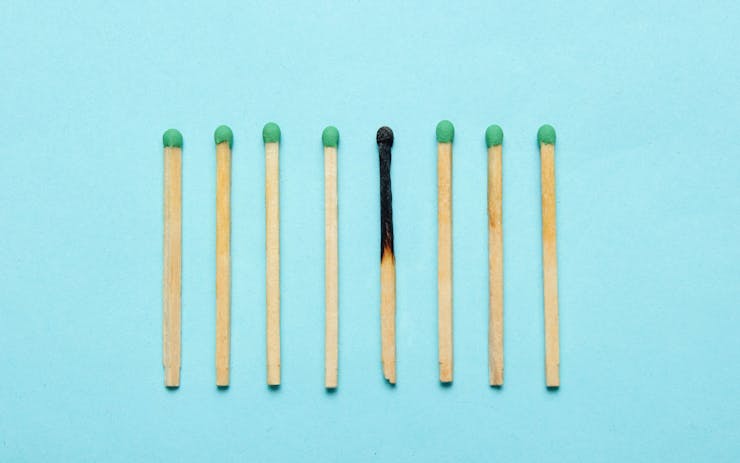Overworking to the point where you physically and mentally tap out, otherwise known as burnout, is becoming all too prevalent in our society. A recent Gallup study indicated that millennial workers are more likely than older generations to say that they are burned out at work. The same study, taken from almost 7,500 full-time US employees, showed that nearly 3 out of 10 millennials stated they are very often or always burned out at work, and about 7 in 10 experience some burnout.
“You feel burnout when you’ve exhausted all your internal resources, yet cannot free yourself of the nervous compulsion to go on regardless,” writes psychoanalyst, Josh Cohen.Life becomes something that won’t stop bothering you
“Life becomes something that won’t stop bothering you. Among its most frequent and oppressive symptoms is chronic indecision, as though all the possibilities and choices life confronts you with cancel each other out, leaving only an irritable stasis.” If this sounds at all familiar, you might be burned out and not even know it.
Unfortunately, there is no catch-all cure for burnout, but some people find ways to manage it, and with great success.
Scientists have previously discovered that a simple 10 minute nap can improve alertness and cognitive performance. It’s no wonder that larger companies like Ben & Jerry’s, Nike, and Zappos have all created napping spaces in their offices. CBRE, a big real estate firm in Toronto, has banned desk lunches, in the hope that employees actually wind-down on their break.
Research from the University of Southern California suggests that downtime or “wakeful resting” is important for recalling personal memories, imagining the future, and maintaining our moral framework. Many folks are looking to tech-free breaks as a way to recharge too, with some even going so far as booking digital detox vacations.
Mary E. Gomes, Ph.D, professor of psychology at Sonoma State University writes, “the mere presence of a cell phone, even when ignored, reduces people’s intellectual acuity, possibly because it takes a distracting level of mental effort to resist the pull of a nearby phone. The more distant the phone, the better the performance.”
Regardless of technique, the concept is the same: we need time outs.
Jill Grindle, the Customer Service Lead at Sundial Growers, encountered many burned out millennials in her previous career as a medical cannabis educator. She was shocked to see so many young people struggling with chronic stress.Everybody says the young generation is lazy and entitled, but what I saw was people under constant pressure
“It was an eyebrow raiser seeing so many young people suffering from conditions that we associate with much older adults—insomnia, stress, anxiety, and depression.
“Everybody says the young generation is lazy and entitled, but what I saw was people under constant pressure, to an extent our generation couldn’t imagine. Millennials are expected to be on 24/7/365, in constant demand by their friends, families, and employers. They never get to turn off, and can’t take the phone off the hook like we could at that age. Plus, they’ve got this constant exposure to blue light from their devices, and to marketing messages that undermine their appearance, accomplishments, and worth as humans… it’s no wonder they’re breaking down.”
Although the age of her patients surprised her, Grindle said that seeing them show up at the cannabis clinic made sense.
“When you’re fighting stresses that you can’t escape, taking care of your body is the only thing you can control. And cannabis is a great fit for those issues—the pain, stress, and sleep deprivation. The right cannabis can make all the difference in the world.”
It’s no wonder that some people are now looking to cannabis as a means to switch off, and potentially combat some of burnout’s effects. A recent Washington State University study examined how people’s self reported levels of stress, anxiety, and depression were affected by smoking different strains and quantities of cannabis at home.
Their work, published in the Journal of Affective Disorders, suggests that smoking cannabis can significantly reduce short term levels of stress—although, it should be noted that the findings indicated overall feelings of depression worsened over long periods. The study specifically showed that “10 puffs or more of cannabis high in CBD and high in THC produced the largest reductions in stress.”
Using cannabis as an effective time out tool may or may not work for you.
If you were to try it, you should test different doses and strains to find the right balance—although there are some that are tailored for relaxation. For a lot of people, using cannabis for relaxation is an end of the day affair—certainly, we’re not going to see any designated cannabis areas at the Ben & Jerry’s office.
One thing’s for sure, whether you make an effort to practice yoga a few minutes a day, relax amongst nature, turn off your phone, or take a different route entirely, everyone needs to wind down. Everyone needs to breathe.







